On the road to opening Pūhoi to Warkworth motorway
Guest
12 June 2023, 1:03 AM
 Familiarise yourself with speed limits, and on and off ramps on the new motorway.
Familiarise yourself with speed limits, and on and off ramps on the new motorway.Construction Update
Safer, more resilient and reliable journeys between Pūhoi to Warkworth are nearly here with the motorway scheduled to open to traffic before the end of June 2023.
The project team is working hard and focused on completing the new motorway as safely and quickly as possible.
Ahead of the road opening, there are a few important updates to share post-opening construction works, motorway operation, and where you can find out
more information.
When the new route opens, it will appear on journey navigation maps including www.journeys.nzta.govt.nz.
You will need to plan your journey – there are new connections at the north and south so check out where the new motorway will go and how you get to your destination nx2group.com.
While driving on the motorway, we acknowledge that it will be an exciting new experience with lots to see. We ask that drivers keep to the posted speed limit, drive to the conditions and don’t be distracted as they drive along the new road.
Pūhoi to Warkworth is a motorway – that means there is no cycling or walking, and no stopping except in an emergency. The current State Highway 1 (SH1) between Pūhoi and Warkworth will become a local road.
This process, known as revocation, will eventually transfer responsibility for the existing SH1 to Auckland Transport.
It will be known as “Old State Highway 1” until the revocation occurs, and Auckland Transport completes the road renaming process.
After the new motorway opens, there will be ongoing work for a number of months to fully complete the project.
This includes work on the Pūhoi on and off-ramps, slip repairs, seasonal planting/landscaping, and final clean-up of works areas.
There will also be work on the removal of machinery and equipment, tidying up the land no longer required for construction access and returning it to its original condition.
The remaining work will largely take place away from the main motorway and have minimal impact on motorists.
You will still see the Fletcher Acciona construction team out and about working to complete the work safely and as quickly as possible, minimising impacts to road users.
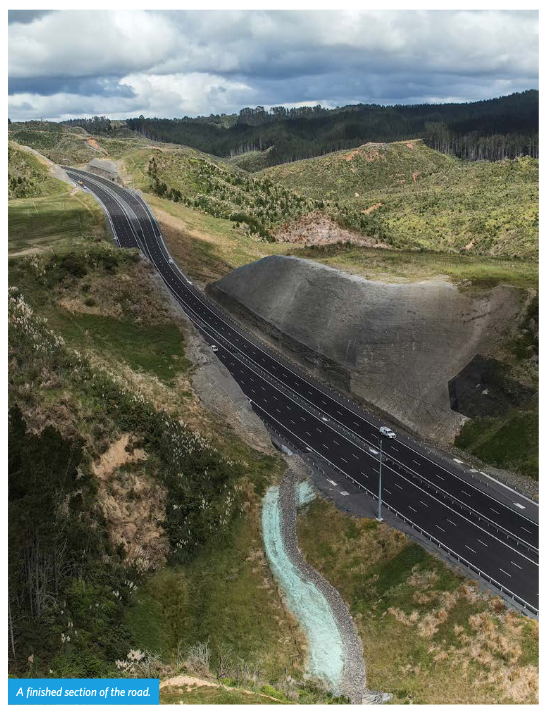
Pūhoi on and off-ramp closures to complete construction
The most significant work that needs to take place is the Pūhoi on and off-ramp closures.
These works can’t be completed until the motorway opens and are necessary to complete the construction of the ramps, which were opened in 2021 for temporary use so that the team could construct the new motorway and connect it to the existing Johnstones Hill Tunnels.
Pūhoi southbound on-ramp
The Pūhoi southbound on-ramp will close immediately after the new road opens, 24/7, for approximately four weeks.
Pūhoi residents, residents south of Moir Hill Road, and southbound traffic from ‘Old SH1’ will not be able to access the southbound on-ramp during the construction period and motorists travelling south from Pūhoi will be detoured via the free route on Hibiscus Coast Highway while we complete this work.
Pūhoi northbound off-ramp
The Pūhoi northbound off-ramp will close at night immediately after the new road opens, from 9pm to 5am daily, for approximately two weeks.
Pūhoi residents and the travelling public will not be able to exit at the northbound off-ramp during this time.
A detour will be in place via the free route, Hibiscus Coast Highway, with motorists exiting SH1 at Grand Drive, Orewa.
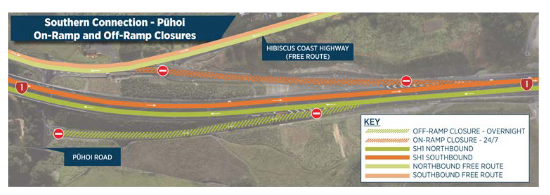
The ramp work is highly weather dependent and can’t be done in the rain or if the ground temperature is too cold, which affects the laying of asphalt.
As we are now approaching the winter months it is likely there will be nights when we can’t work.
The team have allowed for some contingency, however, if there is significant rain or cold weather during these dates, the work will need to be pushed out to the next fine night.
To keep up to date with the closures, please check the NZTA Journey Planner before heading out www.journeys.nzta.govt.nz/
We fully appreciate this will be inconvenient, especially for those living in these areas.
We would like to thank the community for their patience, while we complete the last major step required to provide access to the new motorway and smoother ride for journeys to and from Pūhoi.
Once the on and off-ramps works are complete and open to the public, there will still be some work to be completed on ‘Old SH1’ and Pūhoi Road.
This work will be done under stop/go, for around two weeks.
Four weeks after this has been completed the team will be back to carry out the final line marking.
Speed limits
Waka Kotahi recently announced the new speed limits for the Ara Tūhono – Pūhoi to Warkworth motorway corridor.
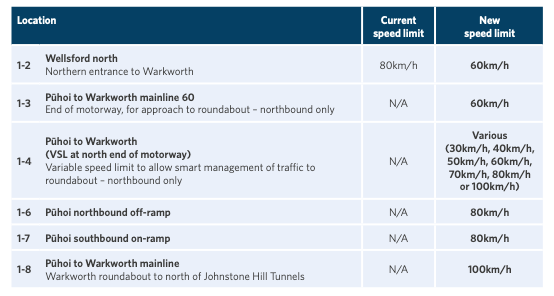
In November and December 2022, Waka Kotahi held a formal consultation through the Interim State Highway Speed Management Plan.
They asked the public for feedback on a number of proposed new speed limits including those for the Ara Tūhono - Pūhoi to Warkworth motorway corridor.
Based on the feedback received through the consultation process, the new permanent speed limits have been set.
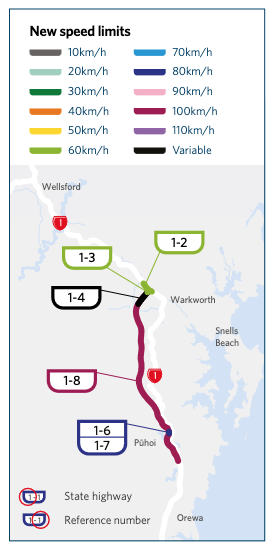
These new speed limits will take effect on the day SH1 Ara Tūhono – Pūhoi to Warkworth motorway opens.
For more information about the speed limits on the new motorway, click here.
Northern Connection & Southern Connection
When the motorway opens, it will have a minimum of four lanes (at least two in each direction), with median barriers, all the way from the Johnstones Hill Tunnels to Warkworth.
Motorists will access the motorway in the north at the Pukerito roundabout or via the southbound ramp at Pūhoi once construction is complete.
Southern connection at Pūhoi
- At the southern end of the Pūhoi to Warkworth motorway, the new motorway connects with the existing SH1 (Northern Gateway) at the Johnstones Hill Tunnels.
- Motorists travelling north can use the left lane to exit off to Pūhoi or to connect into the ‘Old SH1’ – which will eventually be renamed by Auckland Transport.
- Motorists travelling north to Te Tai Tokerau/Northland or Warkworth carry on north to the Pukerito (Northern Connection) roundabout.
- It’s important to remember there are no exits on the new motorway after the northbound Pūhoi off-ramp, for approximately 17kms.
- Motorists travelling south from Pūhoi can join the Pūhoi to Warkworth motorway at the southbound on-ramp once works in this area are completed.
- Motorists travelling north from Pūhoi to Warkworth or south from Warkworth to Pūhoi, will use the Old SH1.
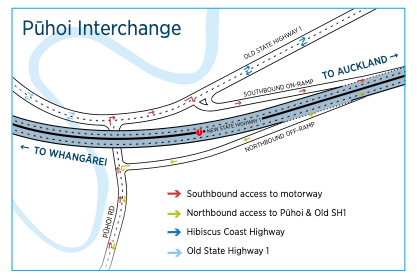
Northern connection at Warkworth
- At the northern end of the Pūhoi to Warkworth motorway, the new motorway connects with the existing SH1 between Kaipara Flats Road and Hudson Road at the multi-lane roundabout called Pukerito.
- Please ensure that you are prepared in advance and get into the correct lane before the roundabout. For example, if you are turning right, signs and road markings will direct you to get into the right-hand lane.
- Motorists travelling from the north towards Auckland/South will either stay in the left lane and take the ‘Old SH1’ through Warkworth or take the right lane and turn right onto the new motorway.
- There are no off-ramps between the roundabout and the Johnstones Hill Tunnels. Motorists need to be aware that once they are on the motorway at Warkworth, there are no exits before the Northern Gateway Toll Road.
- Motorists travelling north on the motorway will take the left-hand exit and carry onto SH1 toward Dome Valley and Northland.
- Northbound motorists travelling to Warkworth or the Matakana area will take the right-hand land (eastbound exit) and turn right onto the ‘old SH1’ and head south (towards Warkworth township or Te Honohono ki Tai).
- Walking and cycling are prohibited on motorways and the new Pūhoi to Warkworth motorway is no different. All southbound on-road cyclists must take the ‘Old SH1’.
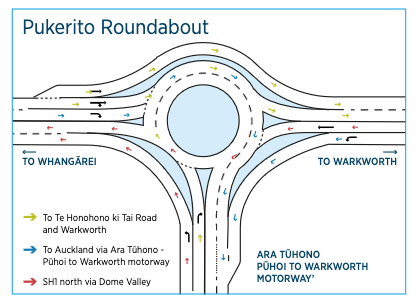
Protecting the environment
It’s important that the environment is looked after during both construction and maintenance of the new road.
One of the measures that have been taken is to construct 12 stormwater wetlands along the motorway.
These wetlands perform the important function of treating surface water runoff that comes off the motorway when it rains before it reaches local waterways.
Water is carried to the wetlands via a network of swales (broad grass channels) and culverts that help to remove small soil particles, and larger floatable material (e.g. litter).
The wetland then works as a giant sponge that cleans the water of excess nutrients, heavy metals, hydrocarbons, and sediment as the water passes through.
Each wetland is specifically designed for the catchment it serves and focuses on slowing down the release of water into the environment which reduces the flooding and erosion potential within stream catchments.
The wetlands are planted with a range of plant species suited to wet or submerged environments.
As the water passes through the sections of the wetland, the flow is slowed down.
This allows the sediment to sink to the bottom; resulting in pollutants being removed before the water is discharged back to existing streams.
JOBS
GENERAL SERVICES
